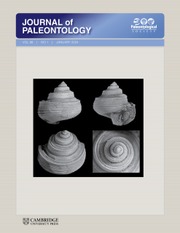
First off, thank you. To this community, this Society—a better bunch of colleagues and friends and dedicated scientists there never was, making this a truly special honor.
I love the Society's recognition of taphonomy over the past several years—first this medal going to Derek Briggs for his work on some of the most exquisite pieces of the fossil record, then to Kay Behrensmeyer working on the bony parts, and now me on the shelly, rock-forming bits, which are proving to be far more reliable carriers of original biological information than any of us suspected. Our field has been making breakneck progress in quantifying more and more aspects of how biological information is captured by sedimentary records. Most of our intuition, and fears, about post-mortem information loss have been disproven or strongly recast.
There's another trifecta today that I love, namely sharing the podium with Lee Hsiang Liow, one of our alums, and Tricia Kelley—we've been friends since meeting on the Calvert Cliffs as graduate students. Derek has noted the long-term minority position of women in the physical sciences, a topic I have always avoided because I never knew what, and how much, to say about my own experience. It was difficult being this kind of pioneer in addition to what we're all trying to do, moving the field forward scientifically. In fact, I came close to walking away three times, despite the security of tenure and despite loving science, loving the teaching, and especially loving the grad-student advising, helping them find their voice and vocation. But here's the take-home, and this is for the women and other minorities in the room, and that is that I would do it all again, even knowing in advance about the painful parts. The rewards of a life in science are huge, and I would not trade any of it. Things have gotten much better for women, and we can learn from that how to make them better more widely and for more people. It will still require allies—those who will speak up rather than be silent when they know something just isn't right. We can't continue to rely on only a few women or other minorities in the room to keep things—and get things—rolling.
Now, some additional thanks. To my advisees and other students whose energy and optimism have made it so much fun and worthwhile—it has been privilege and pleasure; and of course to my paleo colleagues across Chicagoland who have made Chicago such a rewarding and inspiring place to be. Coauthors and other scientific friends are too many to name individually of course, but a few guys were critical, explaining how things actually worked and often working behind the scenes to make sure I got a chance at the start —Don Rhoads and Bob Berner, Donn Gorsline, Dave Raup and Jack Sepkoski, and Jim Valentine. Along the way, Jeremy Jackson turned my head toward societally relevant paleoecology, focused on the Anthropocene; that was 20 years ago, launching many of us toward conservation paleobiology. And I thank my beloved collaborator Adam Tomašových, who has been an exceptional friend for the last 15 years.
Finally, I could not have done this without a New Yorker by my side—a very particular New Yorker. David Jablonski and I met my first day in graduate school, where he drove me nuts—he was extremely opinionated, insufficiently respectful of faculty by my southern sensibilities… But over the next few years, I learned other, more important things from him—he was endlessly generous to others with ideas and time, was sympathetic and supportive and non-judgmental of fellow grad students, and took pleasure in the success of others. He talked about and clearly loved and admired his mother and two sisters, something to look for, not just in a partner but in a collaborator. He wasn't threatened by me, didn't try to tell me what to do, and liked me the way I was. Although we never collaborate—that's intentional, after the first paper—he has always had my back, and I have come to realize that he is usually right—he'll love hearing that in public—even though I don't always take his advice. He is the heart and soul of what teamwork has built in Chicago, and I am proud and grateful to call him mine.
Thank you again for this honor.



